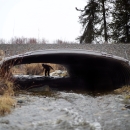States
New JerseyThis project will remove the upper and lower E. R. Collins Dams where the Pequest River meets the Delaware River in the town of Belvidere, New Jersey. These dams cause significant flooding issues for the town and block spawning and rearing habitat for at-risk species. This project will reconnect habitat for American shad, blueback herring, alewife, American eel and native sea lamprey, opening 3 miles of spawning ground. This project will be done in tandem with two other dam removals upstream to maximize benefits and open an additional 58 miles on the Pequest River and its tributaries. This dam removal not only removes a flood hazard, but also increases opportunities for fishing and paddling to help boost regional tourism and local economies.
Project Quick Facts:
| Project Status | In Development |
| Location | NJ, Warren County |
| NFPP Project Funding | $1,478,049 |
| Restoration Techniques | Dam Removal |
| Accomplishments | 3 Stream Miles Reopened |
| Partner Project Lead | The Nature Conservancy in New Jersey |
The National Fish Passage Program combines technical expertise with a track record of success.
Implemented primarily through the Service's Fish and Wildlife Conservation Offices, the National Fish Passage Program provides financial and technical assistance to partners across the country. Since 1999, the program has worked with over 2,000 local communities, Tribes, and private landowners to remove or bypass over 3,400 barriers to fish passage fish passage
Fish passage is the ability of fish or other aquatic species to move freely throughout their life to find food, reproduce, and complete their natural migration cycles. Millions of barriers to fish passage across the country are fragmenting habitat and leading to species declines. The U.S. Fish and Wildlife Service's National Fish Passage Program is working to reconnect watersheds to benefit both wildlife and people.
Learn more about fish passage and reopen access to over 61,000 miles of upstream habitat for fish and other animals. Staff have expertise in fish migration and biology as well as financial, engineering, and planning assistance to communities, Tribes, and landowners to help them remove barriers and restore rivers for the benefit both fish and people.
Fish passage project proposals can be initiated by any individual, organization, government, or agency. However, proposals must be submitted and completed in cooperation with a Fish and Wildlife Conservation Office. (Please note that fish passage projects being used for federal or state compensatory mitigation or required by existing federal or state regulatory programs are not eligible for funding through the National Fish Passage Program.)
CONTACT A FISH PASSAGE COORDINATOR IN YOUR AREA TO GET STARTED.

